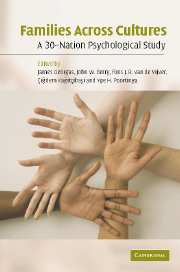Book contents
- Frontmatter
- Contents
- List of figures
- List of tables
- List of contributors
- Acknowledgments
- Prologue
- Part I
- 1 Families and family change
- 2 Cross-cultural theory and methodology
- 3 Theoretical perspectives on family change
- 4 Family portraits from 30 countries: an overview
- 5 Hypotheses
- 6 Methodology of the study
- 7 Results: cross-cultural analyses of the family
- 8 Synthesis: how similar and how different are families across cultures?
- Part II
- Appendix
- References
- Index
7 - Results: cross-cultural analyses of the family
Published online by Cambridge University Press: 10 December 2009
- Frontmatter
- Contents
- List of figures
- List of tables
- List of contributors
- Acknowledgments
- Prologue
- Part I
- 1 Families and family change
- 2 Cross-cultural theory and methodology
- 3 Theoretical perspectives on family change
- 4 Family portraits from 30 countries: an overview
- 5 Hypotheses
- 6 Methodology of the study
- 7 Results: cross-cultural analyses of the family
- 8 Synthesis: how similar and how different are families across cultures?
- Part II
- Appendix
- References
- Index
Summary
This Chapter provides an overview of the cross-cultural data analyses. The Chapter is presented in seven parts. The first two involve the analyses of the psychometric properties of the instruments. “Equivalence and pooled factor Solutions” discusses the equivalence analyses, addressing the question of to what extent the instruments measure the same underlying constructs in each of the 27 countries. Having determined the equivalence (in a few cases leading to the elimination of a few items), we proceed with an analysis of the internal consistencies of the scales in each country in the section on “Internal consistency”. The next two sections address the issue of sample differences in the various groups, namely gender (see p. 142) and educational level of the parents (see p. 145). The question is whether any country differences in education and gender need to be controlled prior to the cross-cultural data analyses. The next two sections of the Chapter involve these cross-cultural data analyses. On pp. 147–58 we present an analysis of the size of cross-cultural differences in the various instruments employed. The exploratory nature of the data analyzes changes for a hypothesis-testing perspective on pp. 158–72. The hypotheses of Chapter 5 are tested here. A final section (pp. 172–85) presents an integration of results that are relevant to the hypotheses.
EQUIVALENCE AND POOLED FACTOR SOLUTIONS
A first necessary step in cross-cultural data analyses involves the question of to what extent the same construct(s) has been measured by an instrument in all cultural groups involved.
- Type
- Chapter
- Information
- Families Across CulturesA 30-Nation Psychological Study, pp. 126 - 185Publisher: Cambridge University PressPrint publication year: 2006
- 8
- Cited by



